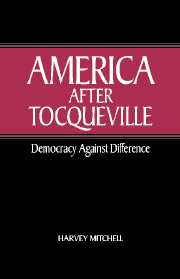Book contents
- Frontmatter
- Contents
- References to Tocqueville's Democracy in America
- Preface
- I PATHS TO DEMOCRACY IN AMERICA
- II BEGINNINGS AND DEMOCRACY
- III AMERICAN DEMOCRACY ON TRIAL
- 7 Difference, Race, and Color in America
- 8 Maintaining American Democracy
- 9 The State, Authority, and the People
- 10 Conclusion
- Works Cited
- Index
8 - Maintaining American Democracy
Published online by Cambridge University Press: 10 August 2009
- Frontmatter
- Contents
- References to Tocqueville's Democracy in America
- Preface
- I PATHS TO DEMOCRACY IN AMERICA
- II BEGINNINGS AND DEMOCRACY
- III AMERICAN DEMOCRACY ON TRIAL
- 7 Difference, Race, and Color in America
- 8 Maintaining American Democracy
- 9 The State, Authority, and the People
- 10 Conclusion
- Works Cited
- Index
Summary
I'd rather live in a civil society than a political society … What we have … is a deconstructing of government, a roll back of politicization. In a civil society you feel a desire to fit into a community and satisfy your neighbors. In a political society, under the heavy hand of government, you expect your neighbors to satisfy you.
How is American democracy faring 160 years after Tocqueville completed Democracy in America? How does it deal with the practical problems Americans face when they think about how to make the practices of justice and human rights work for them? How many believe that voluntary associations, conventional politics, and public policy continue to shape their life's desires? Broad sections of the American public doubtless believe that all serve them well, but sometimes they question whether consensus will always lie in wait for them so long as they are reasoning and well-intentioned individuals. My purpose in this chapter is to see how politics in America is generally perceived and to make some suggestions about how it really has been working in this century. The liberal view is that America benefits from a commitment to consensus politics, to a politics that avoids extremes and seeks agreement, to a politics that avoids conflict and yearns after peace. The reality of how consensus is reached, however, is captured only with difficulty.
- Type
- Chapter
- Information
- America after TocquevilleDemocracy against Difference, pp. 213 - 241Publisher: Cambridge University PressPrint publication year: 2002



